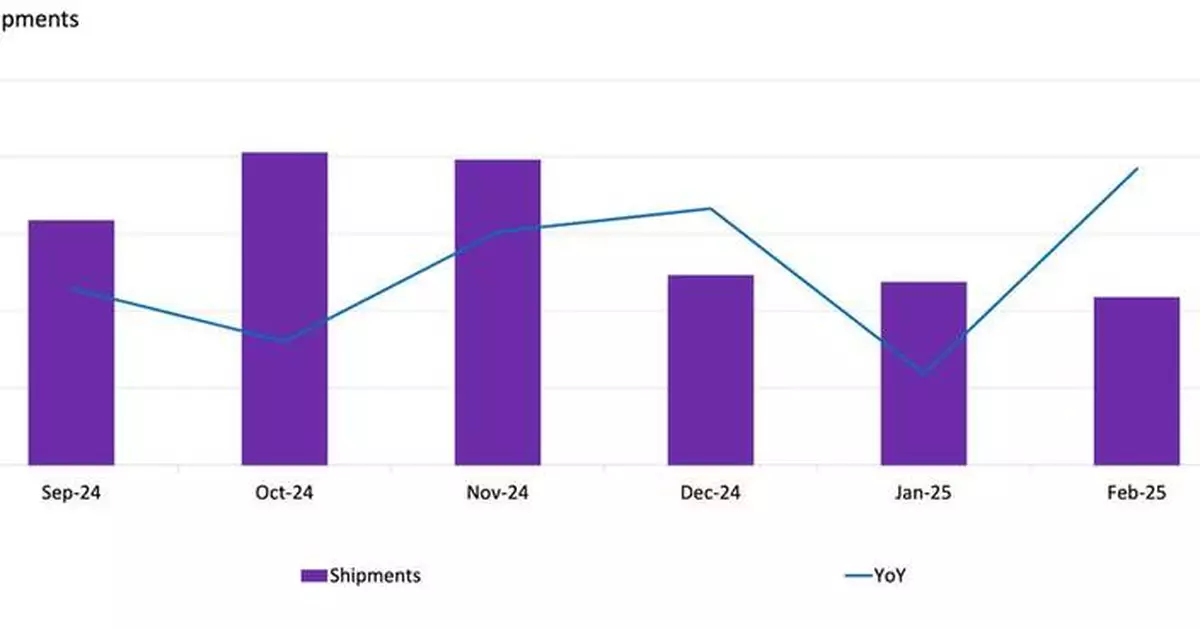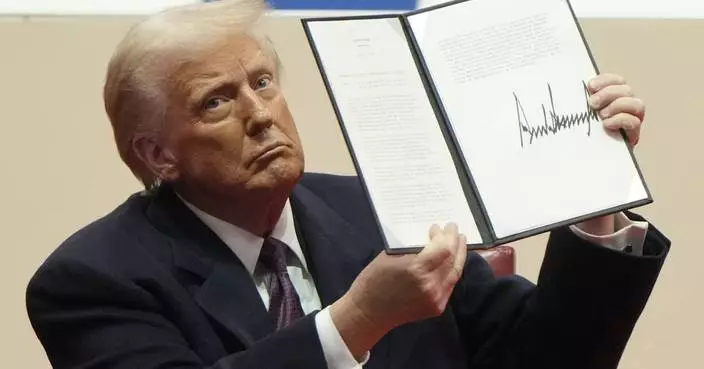LONDON--(BUSINESS WIRE)--Apr 10, 2025--
Omdia’s latest TV monthly tracking data reveals a 19.2% year-on-year growth in global OLED shipments for February 2025. This follows a strong close to 2024, with quarterly OLED shipments surpassing 2 million in the last quarter of 2024, for the first time since 2022. In Europe, OLED continues to dominate as the premium technology of choice, accounting for 23% of TV revenue in 2024, despite representing just 8% of volume. However, the growing challenge from Mini LED is quickly gaining momentum.
This press release features multimedia. View the full release here: https://www.businesswire.com/news/home/20250410477146/en/
According to Omdia’s latest TV Sets Market Tracker - February 2025, LCD shipments fell by 2.4% in February, in contrast to OLED’s 19.2% growth. While OLED has continued its growth streak, after a strong final quarter of 2024, Mini LED is expanding even faster, reaching a shipment volume of 3 million units in 4Q24, outpacing the 2 million achieved by OLED for the first time.
This global view on TV technology consumption is influenced by a surge in Mini LED demand in China, driven by local incentive schemes, aimed at promoting energy-efficient technology. It also signals a major upcoming challenge for the European TV market, where OLED has been long defined as the premium technology.
Matthew Rubin, Principal Analyst, TV Set Research, Omdia explains: “With over 14% of TV shipments in Western Europe priced above $1,000, compared to just under 9% globally, European consumers clearly prioritize premium technology. This is partly due to limited space which has restricted screen size growth, a trend that has spurred the US market. Over recent years, OLED technology has solidified its position in European markets, capturing a large and growing share of revenue. However, major Chinese vendors, such as Hisense and TCL, which have avoided OLED, are now building momentum behind Mini LED, including newly launched RGB Mini LED, positioning it as a challenger in the premium segment.“
Mini LED offers several enticing benefits for consumers, including high brightness, better contrast and enhanced color vibrancy. Crucially, it is cheaper to manufacture than OLED, particularly for larger screen sizes. However, all is not lost for brands reliant on OLED, such as LG, Panasonic, and to a lesser degree Samsung. There remain key barriers to Mini LED adoption, such as consumer terminology confusion (educating buyers on the difference between standard LED LCD, Mini LED and now RGB LED), and the intrinsic brand value that OLED has built in consumers’ minds as the go-to premium technology.
“Overcoming these challenges will take time, but brands must make strategic decisions soon regarding product range and technology positioning. Few brands will want, or be able, to cover all bases, offering both OLED and Mini LED as premium options, as this could dilute their marketing initiatives. However, making the wrong choice or opting for late adoption could have serious consequences, particularly in the highly competitive European market,” concluded Rubin.
ABOUT OMDIA
Omdia, part of Informa TechTarget, Inc. (Nasdaq: TTGT), is a technology research and advisory group. Our deep knowledge of tech markets combined with our actionable insights empower organizations to make smart growth decisions.
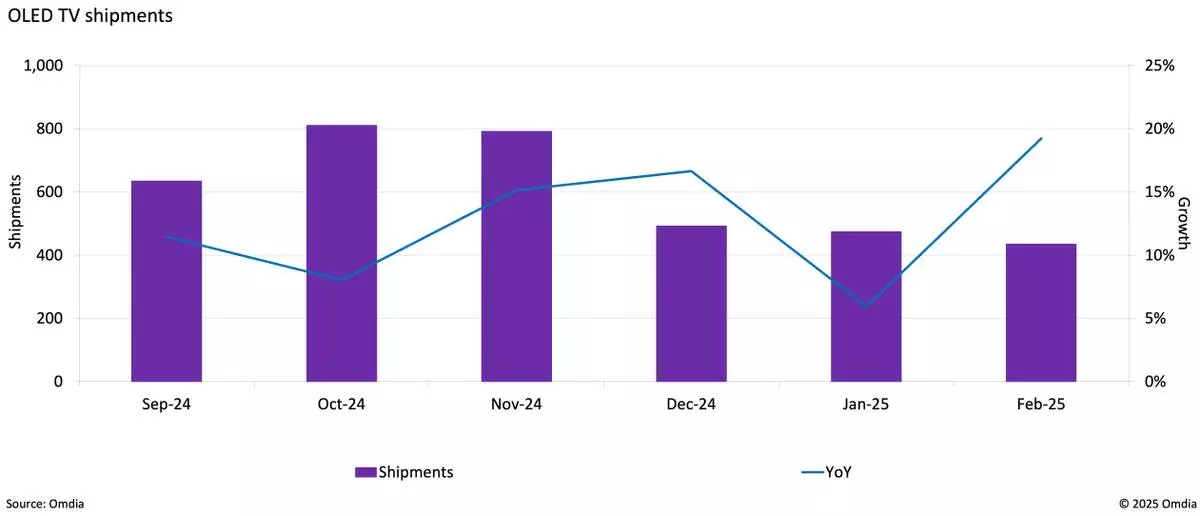

OLED TV shipments
Senate Republicans narrowly voted down a Democratic resolution that would have blocked global tariffs announced by President Donald Trump earlier this month, giving the president a modest win as lawmakers in both parties have remained skeptical of his trade agenda.
And after months of tense negotiations, the U.S. and Ukraine signed a deal that's expected to give Washington access to the country’s critical minerals and other natural resources, an agreement Kyiv hopes will secure long-term support for its defense against Russia.
Here's the latest:
China’s state broadcaster has claimed in a social media post that the Trump administration has been seeking contact with Beijing through multiple channels to start negotiations over tariffs.
In a climbdown, the post by China Central Television says there’s no need for China to talk with the U.S. before the U.S. takes any substantive act but also said “there is no harm” for contact.
“China needs to observe or even force out the true intent on the U.S. side to stay proactive in the talks,” reads the post.
Sun Yun, director of the China program at the Stimson Center, said she also understands “it’s getting close” for talks between the two sides but such talks will be at the working level, not yet between President Trump and Chinese President Xi Jinping.
There’s trouble as House Republicans race to build Trump’s big bill of tax breaks and spending cuts, especially over its trillions in costs and potential Medicaid changes.
Johnson, Majority Leader Steve Scalise, tax writing committee chairman Rep. Jason Smith and the chairman handling health programs, Brett Guthrie, are meeting with Trump.
Trump’s administration released a lengthy review of transgender health care Thursday that advocates for a greater reliance on behavioral therapy rather than broad gender-affirming medical care for youths with gender dysmorphia.
The Health and Human Services report questions standards for the treatment of transgender youth issued by the World Professional Association for Transgender Health and is likely to be used to bolster the government’s abrupt shift in how to care for a subset of the population that has become a political lightning rod.
This new “best practices” report is in response to an executive order Trump issued days into his second term that says the federal government must not support gender transitions for anyone under age 19.
“Our duty is to protect our nation’s children — not expose them to unproven and irreversible medical interventions,” National Institutes of Health Director Dr. Jay Bhattacharya said in a statement. “We must follow the gold standard of science, not activist agendas.”
▶ Read more about the Trump administration’s stance on transgender health care
After months of tense negotiations, the U.S. and Ukraine signed a deal that’s expected to give Washington access to the country’s critical minerals and other natural resources, an agreement Kyiv hopes will secure long-term support for its defense against Russia.
According to Ukrainian officials, the version of the deal signed Wednesday is far more beneficial to Ukraine than previous versions, which they said reduced Kyiv to a junior partner and gave Washington unprecedented rights to the country’s resources.
The deal covers minerals, including rare earth elements, but also other valuable resources, including oil and natural gas, according to the text released by Ukraine’s government.
It doesn’t include resources that are already a source of revenue for the Ukrainian state. In other words, any profits under the deal are dependent on the success of new investments. Ukrainian officials have also noted that it doesn’t refer to any debt obligations for Kyiv, meaning profits from the fund will likely not go toward the paying the U.S. back for its previous support.
▶ Read more about the U.S.-Ukraine minerals deal
To understand the Justice Department’s struggles in representing President Trump’s positions in court, look no further than a succession of losses last week that dealt a setback to the administration’s agenda.
In orders spanning different courthouses, judges blocked a White House plan to add a proof-of-citizenship requirement to the federal voter registration form, ruled the Republican administration violated a settlement agreement by deporting a man to El Salvador and halted directives that threatened to cut federal funding for public schools with diversity, equity and inclusion programs.
That’s on top of arguments in which two judges expressed misgivings to a Justice Department lawyer about the legality of Trump executive orders targeting major law firms and a department lawyer’s accidental filing of an internal memo in court questioning the Trump administration’s legal strategy to kill Manhattan’s congestion toll — a blunder the Transportation Department called “legal malpractice.”
▶ Read more about the Justice Department’s courtroom losses
Consumers can expect higher prices and delivery delays when the Trump administration ends a duty-free exemption on low-value imports from China Friday.
The expiration of the so-called de minimis rule that has allowed as many as 4 million low-value parcels to come into the U.S. every day — mostly from China — is also forcing businesses that have built their models on sourcing production in China to rethink their practices in order to keep their costs down.
But some might actually benefit from the termination of the duty exemption. For instance, companies that make their goods in the U.S. may feel relief from the competition of cheap Chinese imports, and likely experience a brighter sales outlook.
The move, which applies to goods originating from mainland China and Hong Kong, comes on top of President Donald Trump’s new tariffs totaling 145% on China. Beijing has retaliated with tariffs of 125% on the U.S., fueling a trade war between the world’s two largest economies. Sellers are already seeing cautious consumers.
▶ Read more about the end to the de minimis rule
Former Vice President Kamala Harris used a high-profile speech to sharply criticize Trump amid speculation about whether she will mount another presidential campaign or opt to run for California governor.
In her most extensive public remarks since leaving office in January following her defeat to Trump, Harris said Wednesday she’s inspired by Americans fighting Trump’s agenda despite threats to their freedom or livelihood.
Before Wednesday, Harris had barely mentioned Trump by name since she conceded defeat to him in November.
In a 15-minute speech, she spoke to the anxiety and confusion that have gripped many of her supporters since Trump took office but discouraged despair.
Trump went after Harris in a campaign-style rally Tuesday marking his 100th day in office. He sarcastically called her a “great border czar” and a “great candidate,” and repeated some of the applause lines he routinely delivered during the campaign.
▶ Read more about Harris’ remarks
Senate Republicans narrowly voted down a Democratic resolution Wednesday that would have blocked global tariffs announced by Trump earlier this month, giving the president a modest win as lawmakers in both parties have remained skeptical of his trade agenda.
The 49-49 vote came weeks after the Senate approved a resolution that would have thwarted Trump’s ability to impose tariffs on Canada. That measure passed 51-48 with the votes of four Republicans — Sens. Susan Collins of Maine, Lisa Murkowski of Alaska and Mitch McConnell and Rand Paul of Kentucky. But McConnell — who has been sharply critical of the tariffs but had not said how he would vote — and Democratic Sen. Sheldon Whitehouse were absent Wednesday, denying Democrats the votes for passage.
▶ Read more about the vote and resolution
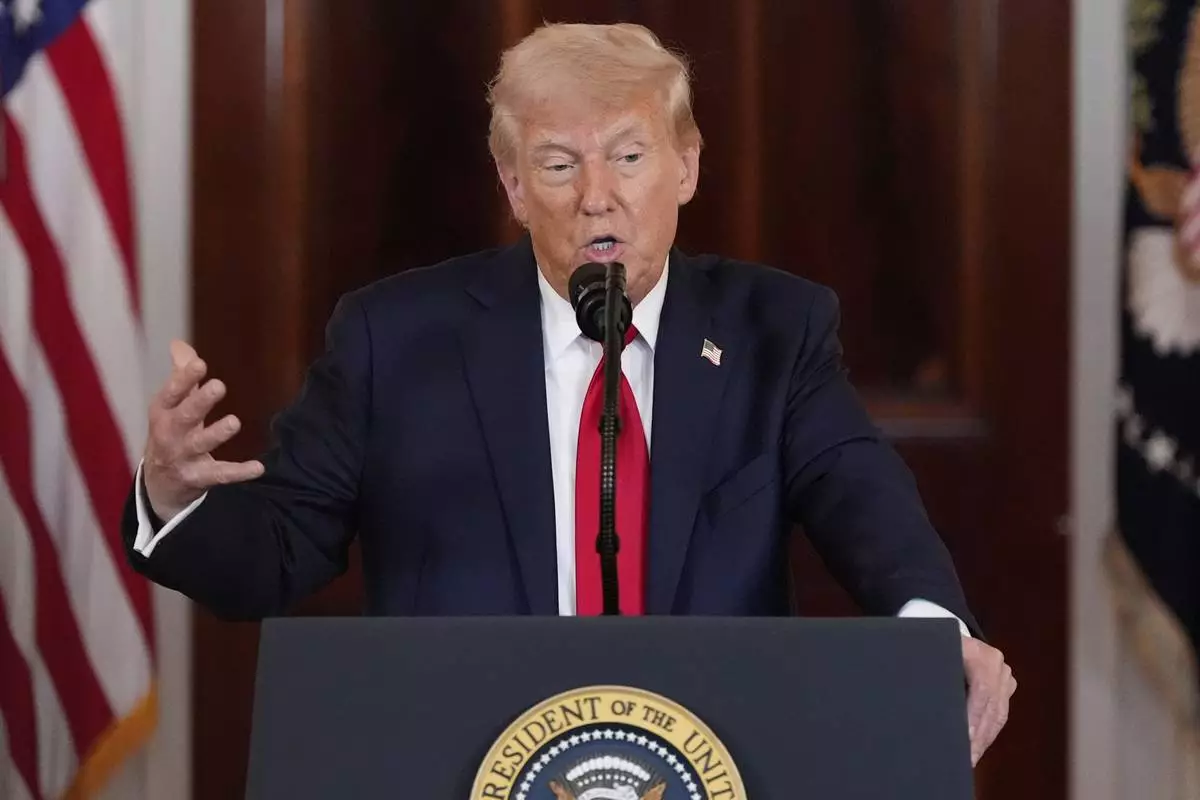
President Donald Trump speaks about investing in America in the Cross Hall of the White House, Wednesday, April 30, 2025, in Washington. (AP Photo/Alex Brandon)
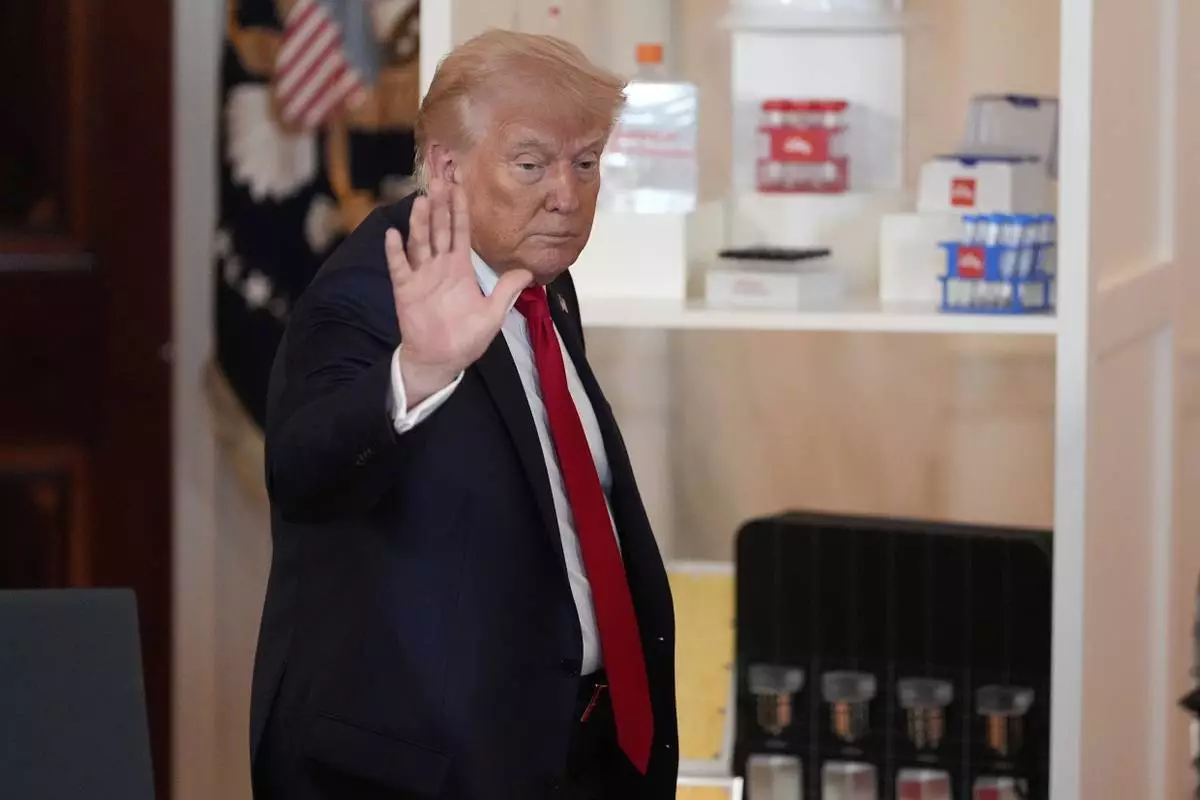
President Donald Trump waves after speaking about investing in America in the Cross Hall of the White House, Wednesday, April 30, 2025, in Washington. (AP Photo/Alex Brandon)
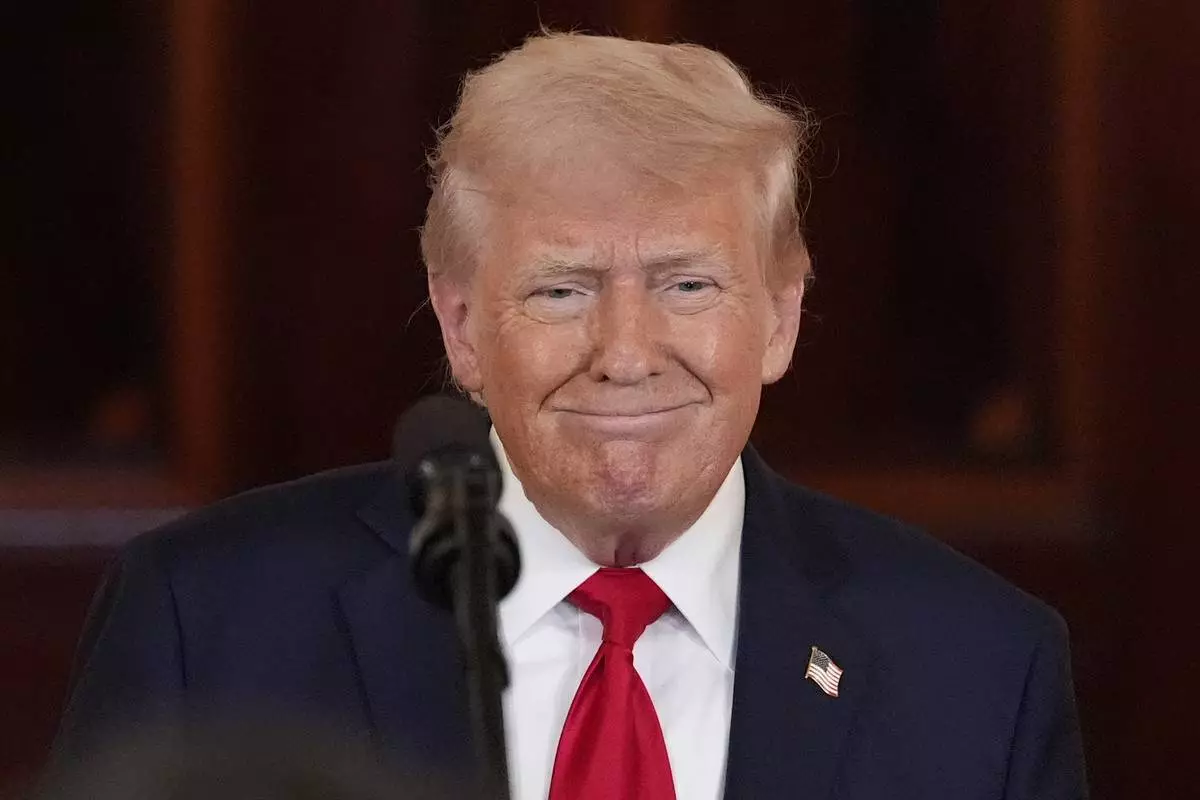
President Donald Trump speaks during an event about investing in America in the Cross Hall of the White House, Wednesday, April 30, 2025, in Washington. (AP Photo/Alex Brandon)




